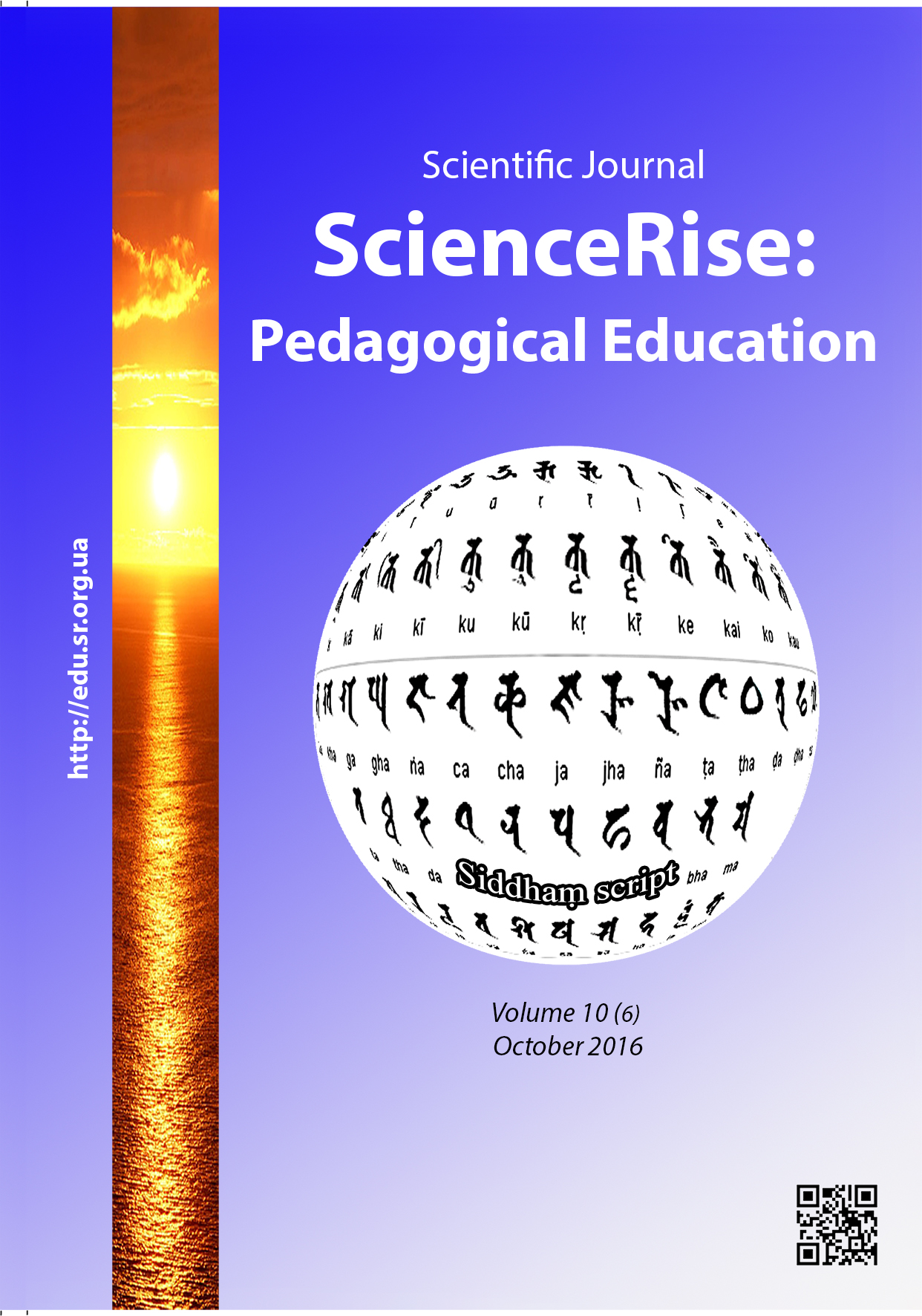The model of ICT-competencies of the teachers
DOI:
https://doi.org/10.15587/2519-4984.2016.80644Keywords:
information and communication technologies, competence, postgraduate teacher education, professional development, continuous educationAbstract
The approaches as to the creation of the model of ICT-competence of the teachers are elucidated in the article. The model grounds the different types of teacher’s activity (understanding of ICT role in education, ICT, learning, organizational-methodological activities, improvement of qualification) and the instruments of his/her ICT- competence measurement by the three levels, according to UNESCO international standards (technological literacy, deepening of knowledge, creation of knowledge. Introduction of the model of ICT-competence of the teachers in postgraduate education favors individualization and continuousness of teachers’ professional education and provide diversification of educational services of postgraduate education. The conditions and results of formation of the model of ICT-competence of the teachers, the prospects of introduction of ICT- competence model were determined: the necessity of integration of the results of formal and informal education, increase of the number of participants of the distant and mixed forms of education, construction of informational-educational environment of postgraduate education. The model of ICT-competence can be realized in the system teacher-school-community that provides the combination of personal, public and state resources for the teacher’s professional development (including his/her ICT-competence formation), innovative development of schools and formation of community and state
References
- Zimnyaya, I. A. (2003). Key competencies – the result of a new paradigm of education Executive. Educationtoday, 5, 34–42.
- Markova, A. K. (1996). Psychology of professionalism. Moscow: Knowledge, 308.
- Morze, N., Kuzminska, O., Protsenko, G. (2013). Public Information Environment of a Modern University/ ICT in Education, Research and Industrial Applications: Integration, Harmonization and Knowledge Transfer. CEUR Workshop Proceedings, 264–272. Available at: http://ceur-ws.org/Vol-1000/ICTERI-2013-p-264-272.pdf
- Morse, N., Kocharian, A. B. (2014). Information and communication competence of teaching staff of the university. Informacijni tehnologii' i zasoby navchannja, 43 (5), 27–39. Avaialble at: http://elibrary.kubg.edu.ua/6198
- Hutorskoj, A. (2002). Competence and educational standards. Jejdos. Available at: http://www.eidos.ru/journal/2002/0423.htm
- Raven, J. (2002). Competence in modern society: the identification, development and implementation. Moscow: Univ. center "Academy, 412.
- Walo, H. (1996). Key competencies for Europe. Report of the Symposium Berne. Switzerland, 15–32. Available at: http://files.eric.ed.gov/fulltext/ED407717.pdf
- Chernikova, L. A. (2008). Sutnist' ponjattja IKT-kompentnosti pedagoga. Komp’juterna gramotnist' vchyteliv z tochky zoru standartiv JeS. Poltava: Poltav. in-t pisljadypl. pedagog. osvity im. M. V. Ostrograds'kogo, 40–42.
- Bykov, V. Ju., Bilous, O. V., Bogachkov, Ju. M. et. al.; Bykov, V. Ju., Spirin, O. M., Ovcharuk, O. V. (Eds.) (2010). Osnovy standartyzacii' informacijno-komunikacijnyh kompetentnostej v systemi osvity Ukrai'ny. Kyiv: Atika, 88. Available at: http://lib.iitta.gov.ua/455/1/zb4.pdf
- Zhaldak, M. (2005). Some methodological aspects of teaching science in school and Pedagogical University. Scientific notes Ternopil National University. B. Hnatyuk. Series: Pedagogy, 6, 17–24.
- The structure of the ICT competence of teachers. UNESCO recommendations. Available at: http://iteach.com.ua/files//content/5EDCFd01.pdf
- The Declaration of Principles "Building the Information Society – a global challenge in the new Millennium" (2003). Verhovna Rada Ukrai'ny. Available at: http://zakon3.rada.gov.ua/laws/show/995_c57
- Dendev, B. (2013). Information and communication technologies in education. B. Dendeva. Moscow: IITO JuNESKO, 320. Available at: http://iite.unesco.org/pics/publications/ru/files/3214728.pdf
- Kremen, V. G. (Ed.) (2008). Encyclopedia of Education. Kyiv: YurinkomInter, 1040.
- Miao, F. Effectiveuseof ICT inteachingandlearning. Vidkryte osvitnje e-seredovyshhe suchasnogo universytetu. Available at: https://www.youtube.com/watch?v=dLa4lo3eyYc
Downloads
Published
How to Cite
Issue
Section
License
Copyright (c) 2016 Наталія Вікторівна Морзе, Ірина Павлівна Воротникова

This work is licensed under a Creative Commons Attribution 4.0 International License.
Our journal abides by the Creative Commons CC BY copyright rights and permissions for open access journals.
Authors, who are published in this journal, agree to the following conditions:
1. The authors reserve the right to authorship of the work and pass the first publication right of this work to the journal under the terms of a Creative Commons CC BY, which allows others to freely distribute the published research with the obligatory reference to the authors of the original work and the first publication of the work in this journal.
2. The authors have the right to conclude separate supplement agreements that relate to non-exclusive work distribution in the form in which it has been published by the journal (for example, to upload the work to the online storage of the journal or publish it as part of a monograph), provided that the reference to the first publication of the work in this journal is included.








